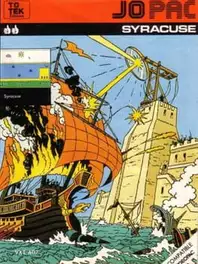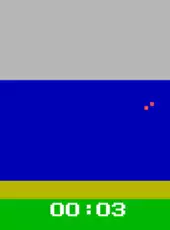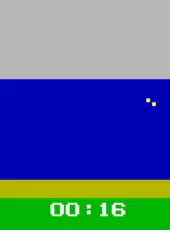
Syracuse
Genre:
Shooter
Platform:
Odyssey 2 / Videopac G7000
Syracuse recreates the Siege of Syracuse that took place during 214–212 BC, more specifically the battle which supposedly used the legendary weapon developed by Archimedes. The weapon, sometimes called "Archimedes heat ray" consisted in a mirror used to focus sunlight onto approaching Roman ships, setting them on fire.
This is a game for two players. One player controls Archimedes as he uses the mirror to reflect the sunlight at the Roman galleys. The other player controls the Roman galleys as they try to reach the base of the tower where Archimedes stands, to land troops at Syracuse. The galleys can catapult rocks to destroy Archimedes mirror in order to approach the tower without risk. The longer the player holds the button, the farther the rock goes; the rocks can also have its route altered during flight if the player moves the joystick up or down. If the mirror is broken, Archimedes can get a new one by leaving off the right side of the screen. Archimedes can move the mirror up or down to aim the reflection against one of the three approaching galleys. If a galley is hit twice by the sun light it will catch fire, and a new one will appear on the left side of the screen to replace it. The number of mirrors broken and galleys sunk is registered in the lower side of the screen.
Each game can last one whole day, from sunrise to sunset (8 minutes in real time). The sun rises in the left and sets in the right, and sometimes a cloud passes by, blocking some sun rays. The game can end in three ways: when the time runs out, when one player scores 99 points or when the three galleys reach the bottom of the tower. There are 4 game variations, with different sunbeam speeds, mirror position numbers, rock speeds and trajectory modification.
This is a game for two players. One player controls Archimedes as he uses the mirror to reflect the sunlight at the Roman galleys. The other player controls the Roman galleys as they try to reach the base of the tower where Archimedes stands, to land troops at Syracuse. The galleys can catapult rocks to destroy Archimedes mirror in order to approach the tower without risk. The longer the player holds the button, the farther the rock goes; the rocks can also have its route altered during flight if the player moves the joystick up or down. If the mirror is broken, Archimedes can get a new one by leaving off the right side of the screen. Archimedes can move the mirror up or down to aim the reflection against one of the three approaching galleys. If a galley is hit twice by the sun light it will catch fire, and a new one will appear on the left side of the screen to replace it. The number of mirrors broken and galleys sunk is registered in the lower side of the screen.
Each game can last one whole day, from sunrise to sunset (8 minutes in real time). The sun rises in the left and sets in the right, and sometimes a cloud passes by, blocking some sun rays. The game can end in three ways: when the time runs out, when one player scores 99 points or when the three galleys reach the bottom of the tower. There are 4 game variations, with different sunbeam speeds, mirror position numbers, rock speeds and trajectory modification.
Released on Dec 31st 1981
Summary:
In the year 213 B.C. the town of Syracuse in southern Sicily, was besieged by the troops of the Roman consul Marcellus. The battle lasted three years, giving Archimedes time to perfect his ingenious system for defending Syracuse.Archimedes' idea was to reflect the sun off a mirror onto the enemy ships. The sunlight reflected in this way would be concentrated enough to set fire to the Roman warships.
Despite a heroic defense, the Romans won. As for Archimedes, he was so absorbed in a geometry problem when the Romans landed, that he was killed by a Roman soldier because he refused to answer his questions.
With the Syracuse game you will be able to be part of this historic event as often as you like.
So, to your joy-sticks ! And do not forget that the battle must start at sunrise and finish at sunset.
×
![]()



